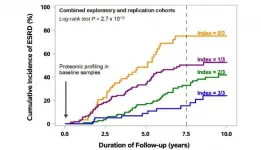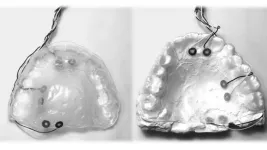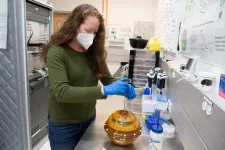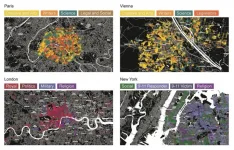(Press-News.org) Elevated levels of three specific circulating proteins are associated with protection against kidney failure in diabetes, according to research from the Joslin Diabetes Center that will be published 30th June in Science Translational Medicine.
"As well as acting as biomarkers for advancing kidney disease risk in diabetes, the proteins may also serve as the basis for future therapies against progression to the most serious types of kidney disease," said Andrzej S. Krolewski MD, PhD, senior author on the publication, senior investigator at Joslin Diabetes Center and professor of medicine at Harvard Medical School. This would likely include the delay and prevention of end stage renal disease (ESRD), which is the most serious and advanced stage of diabetic kidney disease.
The study marks a move towards looking for markers associated with protection against, rather than increased individual risk, for the rapid progression of diabetic kidney disease. This should more directly derive potential targets for slowing progression since it is based on the thinking that individuals with slow progression will have protective factors of some sort.
"Our research became possible only recently," said Dr. Krolewski. "We were able to search for these markers thanks to the development of high-throughput proteomic platforms. More importantly, the availability of biobank specimens that we established many years ago in the Joslin Kidney Study was critical."
According to the report, the researchers profiled levels of just over 1000 proteins in the plasma samples that were taken at baseline in the original study. All of them had diabetes and moderately impaired kidney function. They used two cohorts of individuals with either type 1 or type 2 diabetes that were followed for between 7 and 15 years.
The main aim was to identify proteins that were elevated in individuals with slow or minimal decline in kidney function over the follow-up period. Notably they did validate the initial findings in a further cohort of individuals with type 1 diabetes.
Working through potential candidate proteins, they found three proteins that appeared to offer protection against progressive decline. These were fibroblast growth factor 20 (FGF20), angiopoietin-1 (ANGPT1) and tumor necrosis factor ligand superfamily member 12 (TNFSF12).
In each case elevated circulating levels reduced odds of progressive kidney decline and progression towards ESRD. The combined effect of having elevated levels of all three proteins translated to very low risk for ESRD.
"The protective effects of these proteins seem to be independent, which suggests that there are multiple mechanisms involved. They may be causally related to the disease process or represent as-yet unidentified pathways involved in progressive renal decline," said first author Zaipul Md Dom PhD, a research fellow in the Dr. Krolewski's laboratory
The authors go further to look at the current biological knowledge relating to the individual proteins and kidney disease, identifying a number of potential mechanisms that might explain their protective effects. According to Dr. Krolewski these are potential new routes for research that they will follow.
Dr Kevin Duffin, co-author on the publication, and chief operating officer at Eli Lilly, Diabetes and Diabetic Complications said: "Our study identified specific circulating proteins that were depleted in diabetes patients with kidney disease who progressed to ESRD. These results suggest a personalized medicine approach might be possible for treating patients with low levels of the protective proteins. We think that administering protein therapeutic mimetics or treatments that enhance circulating levels of these depleted proteins might be the future."
Dr. Krolewski added: "We have already started to develop protocols on how to measure concentrations of the protective proteins in clinical settings. We hope that these proteins can then be used to identify patients at risk of progression to ESRD, who can then be treated with new therapies."
INFORMATION:
Other contributors to the research include Eiichiro Satake, Jan Skupien, Bozena Krolewski, Kristina O'Neil, Jill Willency, Simon Dillon, Jonathan Wilson, Hiroki Kobayashi, Katsuhito Ihara, Towia Libermann, and Marlon Pragnell. The contributors are based variously at the Joslin Diabetes Center, Harvard Medical School, Jagiellonian University Medical College, Eli Lilly and company, the Beth Israel Deaconess Medical Center and JDRF International. Competing interests are reported in the Science Translational Medicine report.
Funding for the study was provided by JDRF, National Institutes of Health, Novo Nordisk Foundation, Sunstar Foundation, Foundation for Growth Science from Japan, Uehara Memorial Foundation, Japan Society for the Promotion of Science and NIH Diabetes Research Foundation. Full details are available in the Science Translational Medicine report.
Corresponding author: Andrzej S. Krolewski MD, PhD (andrzej.krolewski@joslin.harvard.edu)
Reference: Md Dom et al. Circulating proteins protect against renal decline and progression to end-stage renal disease in patients with diabetes. Science Translational Medicine 2021, 13: eabd2699
DOI: 10.1126/scitranslmed.abd2699
About Joslin Diabetes Center
Joslin Diabetes Center is world-renowned for its deep expertise in diabetes treatment and research. Joslin is dedicated to finding a cure for diabetes and ensuring that people with diabetes live long, healthy lives. We develop and disseminate innovative patient therapies and scientific discoveries throughout the world. Joslin is an independent, non-profit institution affiliated with Harvard Medical School, and one of only 16 NIH-designated Diabetes Research Centers in the U.S.
For more information about the Joslin Diabetes Center, visit http://www.joslin.org or follow @joslindiabetes | One Joslin Place, Boston, MA 617-309-2400
A 7- to 15-year longitudinal study of 358 diabetics has linked 3 proteins in blood with a slower progression of diabetic kidney disease and progressive kidney failure. The results from Zaipul Md Dom and colleagues suggest that the proteins could help researchers identify diabetics most at risk of kidney damage, potentially enabling earlier interventions and treatment. Despite advancements in blood sugar control and kidney therapies, patients with type 1 or type 2 diabetes still face a high risk of diabetic kidney disease. This condition can eventually progress to end-stage kidney disease, but some patients show slower kidney decline than others. In recent ...
Despite unprecedented advancements in technology and countless depictions of complex human-AI interactions in sci-fi movies, we have yet to fully achieve AI bots that can engage in conversation as naturally as humans can. Kushal Chawla, researcher at the USC Institute for Creative Technologies (ICT) and a doctoral student in computer science, along with collaborators at both the USC Information Sciences Institute (ISI) and ICT are taking us one step closer to this reality by teaching AI how to negotiate with humans.
The research, presented at the 2021 Annual Conference of ...
Although cardiovascular disease is the main cause of illness among women in the U.S., certain conditions such as coronary microvascular disease (CMD) cannot be easily diagnosed. In a new study, researchers at the University of Illinois Urbana-Champaign have identified specific biomarkers for CMD, which might reduce future hospitalizations.
CMD damages the inner walls of blood vessels causing spasms and decreased blood flow to the heart muscle. "Clinicians look for plaque formation in the blood vessels, which does not occur in CMD," said Zeynep Madak-Erdogan (CGD/EIRH/GSP), an associate professor of nutrition. "Usually, ...
The virus that gives rise to COVID-19 is the third coronavirus to threaten humanity in the past two decades. It also happens to move more efficiently from person to person than either SARS or MERS did. The first African case of COVID-19 was diagnosed in Egypt in mid-February of 2020. Four weeks later, the first lockdowns began across Africa. Steven Schiff, Brush Chair Professor of Engineering at Penn State, who already had established research partnerships in Uganda, saw an opportunity for his team to apply what they were learning from their ongoing efforts to track and control infectious disease and ...
Ten estuaries on the West Coast of North America have been identified as priority locations for expanding the use of conservation aquaculture in a study led by the Native Olympia Oyster Collaborative and funded by the Science for Nature and People Partnership (SNAPP). SNAPP is a research collaboration supported by the National Center for Ecological Analysis & Synthesis (NCEAS) at UC Santa Barbara.
The study, published in Plos One, recommends locations and methods for the strategic expansion of conservation aquaculture to bring back Olympia oyster populations -- both to local estuaries where they have most declined, and into more local restaurants for oyster lovers to dine on. The authors propose using aquaculture in these estuaries -- ...
Even the mundane act of swallowing requires a well-coordinated dance of more than 30 muscles of the mouth. The loss of function of even one of these, due to disease or injury, can be extremely debilitating. For these people, nerve stimulation offers a ray of hope to regain some of their lost oral function.
In a new study, researchers at Texas A&M University have delineated the minimum size of electrical currents needed to provide sensation in different parts of the mouth. The researchers said their study is a first but vital step toward building electrical stimulation implants that can restore essential intraoral functions that are lost due to nerve or brain damage.
The results of the study are published in the journal ...
Magnetic resonance imaging (MRI) is widely used in medicine to detect, diagnose and treat diseases such as cancer, while relying on experts' interpretation of images. Quantitative MRI, which obtains numerical measurements during the scans, can now potentially offer greater accuracy, repeatability and speed -- but rigorous quality control is needed for it to reach its full potential, according to a new study.
Researchers at the National Institute of Standards and Technology (NIST) led the study by 11 institutions comparing measurements by 27 MRI scanners from three vendors at nine clinical sites around the country. To obtain reference values and disentangle sources of bias and variation, the study used a tissue stand-in, or "phantom," originally ...
A city's street names can provide a glimpse into its cultural value system and a way to quantify cultural indicators, according to a study published June 30, 2021 in the open-access journal PLOS ONE by Melanie Bancilhon from Washington University in Saint Louis, U.S., and colleagues.
Ever since named streets have existed, they have been used as a form of social engineering, mirroring a town or city's social, cultural, political, and religious values. Building off this concept in what they term "streetonomics," Bancilhon and colleagues used street names as an alternative route to quantify cultural indicators in four influential Western cities: Paris, Vienna, London, and New York.
The authors used multiple open data sources ...
The deep sea Pacific Salas y Gómez and Nazca ridges are highly biodiverse and host unique fish and invertebrate taxa, according to video surveys.
INFORMATION:
Article Title: Deep-sea biodiversity at the extremes of the Salas y Gómez and Nazca ridges with implications for conservation
Funding: The expeditions were funded by the National Geographic Society and Pristine Seas donors with support to AMF. Conservation International, the Paul M. Angell Family Foundation, Tom and Currie Barron, and Alan Eustace provided additional support to DW, WG and JG. The Chilean Millennium Science Initiative Program grant #NC120030 ...
In the German population, a surprisingly high 6% of under-18s are at risk of cognitive decline, falls and more from the cumulative effect of anticholinergic medications such as antihistamines and antidepressants.
INFORMATION:
Article Title: Anticholinergic burden: First comprehensive analysis using claims data shows large variation by age and sex
Funding: The authors received no external funding for this work.
Competing Interests: UH, OR, MB and JR are working at an independent, non-profit research institute, the Leibniz Institute for Prevention Research and Epidemiology - BIPS. Unrelated to this study, BIPS occasionally conducts studies financed by the pharmaceutical industry. Almost exclusively, these are post-authorization ...







